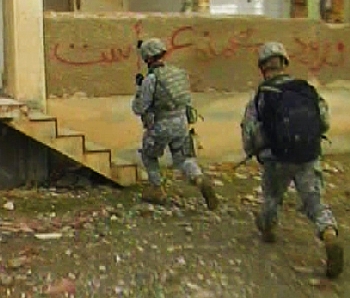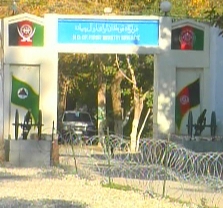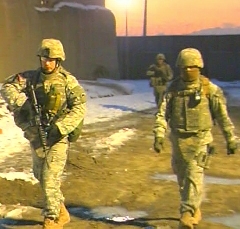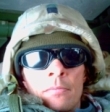
Publisher:
Bonnie King
CONTACT:
Newsroom@Salem-news.com
Advertising:
Adsales@Salem-news.com

~Truth~
~Justice~
~Peace~
TJP
Sep-11-2007 05:53

 TweetFollow @OregonNews
TweetFollow @OregonNews
Considering American Heroes on September 11th
Tim King Salem-News.comAre we prepared to take care of today's heroes? As a society we haven't always met the test.
 American soldiers on patrol in Kabul, Afghanistan Photos by: Tim King |
(SALEM, Ore.) - As we commemorate the day that the United States was attacked in 2001, we must remember all who have perished in the ensuing wars overseas, and veterans who preceded them in prior wars. Even more importantly, we must take the time to appreciate the people who have served and returned.
Today, many of these people are the ones who answered the call, and they have been sent to Iraq and Afghanistan repeatedly in most cases, to a war on terrorism. In most cases, they did not ask to go, and by many estimates their good natures have been abused and overextended by a military plan that was not well thought out, or executed.
In spite of that, most people profess their support of the troops in this country. They have yellow ribbons on their cars, take their kids to parades, and even get weepy eyed when a country song comes on the radio about a soldier missing his little girl. These are people with the best intentions, and many are even related to a soldier in the war.
But historically, America does not take the best care of its veterans, and that "care" goes far beyond a veteran's medical needs; it includes the society that a veteran returns to after spending time in a combat zone.
It means open doors, opportunities to gain an education and a good spot in the workplace.
In a good and fair world, there are always ample jobs for qualified people, but many veterans would tell you that was not the case for them when they returned home. This includes specifically the Vietnam era and World War Two.
These are soldiers who fought before the advent of modern technology, and there is no way many who fought in those 20th Century wars were prepared for what they were about to see and experience.
 Entrance to the Afghan Army base at |
I also see another side to today's young combat soldier that others will see and experience over time; these are frequently computer whiz kids who spend a lot of their extra time immersed in high technology pursuits. They shoot pictures and edit videos and they email and interact and all of these hobbies relate to different aspects of the high tech world that features a number of job roles.
I suspect that the typical soldier of forty or sixty years ago while highly intelligent, would agree that they had only a small fraction of the number of tools they could learn with. Their World Wide Web was a set of Encyclopedias if they were fortunate, and they were pretty tough to pack around.
Even if there is a bright side here and there, the problems facing veterans returning home from service in Iraq and Afghanistan are mounting as the number of soldiers suffering from Post Traumatic Stress Disorder tops 330,000, according to reliable estimates.
 Many of these veterans have seen and experienced things that go well beyond description. For countless thousands, the trauma and fear and associated horrors of war are ingrained, and our national policy means the number of casualties just keeps growing.
Many of these veterans have seen and experienced things that go well beyond description. For countless thousands, the trauma and fear and associated horrors of war are ingrained, and our national policy means the number of casualties just keeps growing.
If their families support them, these warriors can return to a normal life and be well adjusted people. Sadly for active duty members and their families, any military treatment for PTSD is logged in a servicemember's personal record, this keeps many from seeking help. But there are other resources that respect privacy and offer ways for veterans to find therapy PTSD. There are also resources available for family members.
Employers can make room for returning veterans and give them certain allowances when they need to. I think people who hire them will be impressed most often, because today's soldier is more professional than ever, and almost always more worldly than their civilian counterparts.
In the end it is up to us, the public, to put pressure on employers, the Veterans Administration, and our elected officials, and ensure that our military forces are treated with fairness and equity, and that the policies they are asked to carry out are reasonable and ethical. It was not long ago that the people of this nation turned their backs on veterans. Beating The Vietnam Syndrome
The war in Vietnam began officially in November 1964, and was finally resolved in April, 1975. It was the longest war in American history, and while many recall society at this time as being vastly anti-war, it is important to remember that it did not start out that way.
Americans didn't know very much about Vietnam when the war began, and it was not even twenty years after the celebrated heroism of WWII. But they knew they were supposed to hate Communism and that South Vietnam, a land colonialism by the French who were defeated in the mid 1950's, was trying hard resist Communist forces from the north.
It was a ball put into motion by President John F. Kennedy, and kicked across the field by his successor Lyndon B. Johnson.
As the years went by the war escalated, and increasing numbers of our military forces were killed, taken prisoner and injured. Gradually, the movement against the war gained momentum, but it did not happen overnight. It took about four years, by the summer of 1968, for the country to have changed drastically, and huge numbers of people turned against the war in Vietnam, including many of the veterans who had fought there.
The Vietnam War was the first time American forces labeled huge swaths of countryside as "Free Fire Zones" where anybody present could be gunned down. This type of indiscriminate killing was allowed because the areas were known for having "Viet Cong sympathizers," and the "VC" were the communist forces who killed Americans.
In reality, the Americans killed these villagers for working with their enemies, the Communists. The North Vietnamese Army and Viet Cong Communists in turn, killed these same people if there cooperated with Americans. Clearly a catch-22.
These policies and many others, like burning villages to the ground, earned the war a bad name when it was being waged. Government officials like President Richard Nixon criticized the media for showing footage of combat in Vietnam, and exposing atrocities like the My Lai massacre. Then reporters were beaten by club wielding police officers during the 1968 Chicago Democratic Conventions, and college and university riots and marches took the stage and were covered by the news.
So you can hold the lack of success of the war in Vietnam against the media and press who were a different breed of people than who we see today, or you can hold those policies accountable that led to pictures of soldiers burning people out of of their homes in the first place.
Fortunately today, we have learned to look at the individual accomplishments of the soldiers and seem to have found the ability to conclude that for the most part, soldiers in combat overseas are doing a good job in their lives as well as their professions.
Some people say it is not good to look back and bemoan events of the past that make us sad, but I speculate that very positioning can lead to our greatest failures. When we elevate the status of veterans in society, we better the chance of keeping their stories and experiences alive.
------------------------------------------------------------
 Tim King is a former U.S. Marine with almost twenty years experience on the west coast as a television news producer, photojournalist and reporter. Today, in addition to his role as a war correspondent in Afghanistan where he spent the winter of 2006/07, this Los Angeles native serves as Salem-News.com's Executive News Editor. Salem-News.com is the nation's only truly independent high traffic news Website, affiliated only with Google News. You can send Tim an email at this address: newsroom@salem-news.com
Tim King is a former U.S. Marine with almost twenty years experience on the west coast as a television news producer, photojournalist and reporter. Today, in addition to his role as a war correspondent in Afghanistan where he spent the winter of 2006/07, this Los Angeles native serves as Salem-News.com's Executive News Editor. Salem-News.com is the nation's only truly independent high traffic news Website, affiliated only with Google News. You can send Tim an email at this address: newsroom@salem-news.com
Articles for September 10, 2007 | Articles for September 11, 2007 | Articles for September 12, 2007
Quick Links
DINING
Willamette UniversityGoudy Commons Cafe
Dine on the Queen
Willamette Queen Sternwheeler
MUST SEE SALEM
Oregon Capitol ToursCapitol History Gateway
Willamette River Ride
Willamette Queen Sternwheeler
Historic Home Tours:
Deepwood Museum
The Bush House
Gaiety Hollow Garden
AUCTIONS - APPRAISALS
Auction Masters & AppraisalsCONSTRUCTION SERVICES
Roofing and ContractingSheridan, Ore.
ONLINE SHOPPING
Special Occasion DressesAdvertise with Salem-News
Contact:AdSales@Salem-News.com





Terms of Service | Privacy Policy
All comments and messages are approved by people and self promotional links or unacceptable comments are denied.
[Return to Top]
©2026 Salem-News.com. All opinions expressed in this article are those of the author and do not necessarily reflect those of Salem-News.com.